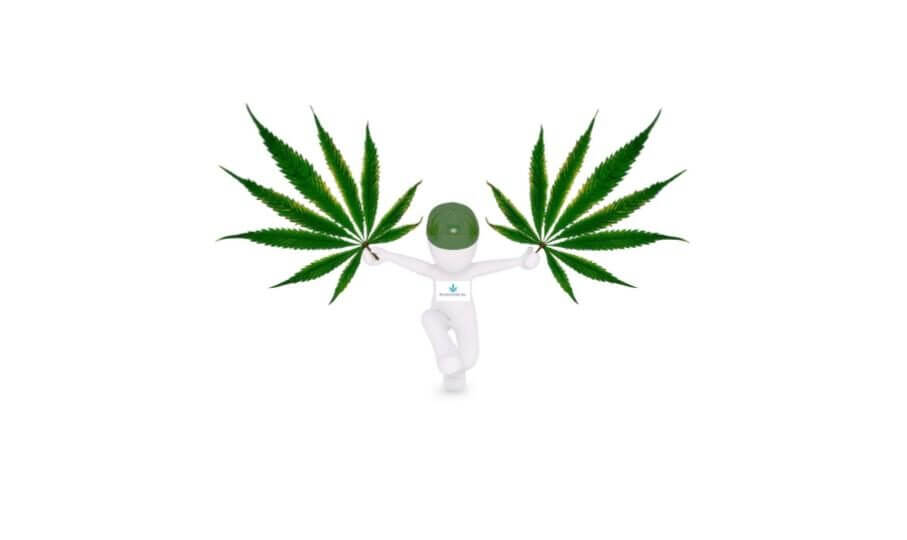Where does CBD come from?
The ancestral hemp plant (cannabis in Latin), is probably the oldest plant domesticated by man. We find traces of its use since -4000 BC.
It contains more than 500 natural compounds (terpenes, flavonoids, among others) and more than 120 cannabinoids. CBD is one of these molecules that comes from the flower of the plant, with several therapeutic properties.
What is CBD?
CBD, or cannabidiol, is a phytocannabinoid (natural cannabinoid), a non-addictive, safe, non-toxic substance, and is one of more than one hundred “phytocannabinoids” that are unique to cannabis and give the plant its robust therapeutic profile.
The cultivation of CBD does not require external chemical inputs, such as fertilizers or pesticides, and requires very little water. Hemp is therefore a robust plant, which allows multiple uses, without the need for chemicals.
Properties of CBD
CBD stimulates the endocannabinoid system, which represents a set of receptors that can be found in many parts of the human body. Additionally, it stabilizes and regulates the balance of important factors of the organism: appetite, sleep, temperature, stress, among others.
Like humans, animals are also endowed with the cannabinoid receptor system, therefore, they respond equally to the supply of cannabidiol. By putting CBD oil on their food or directly under their tongue, they can benefit from the properties of CBD.
Is CBD safe?
The World Health Organization published its review of the cannabinoid in 2018 and found that “in humans, CBD shows no effects indicative of any abuse or potencial of dependence”.
(OMS, 2018). Additionally, The World Anti-Doping Agency excluded CBD from the list of banned substances, so CBD is fast becoming a safe and popular alternative to many conventional painkillers, anti-inflammatories, and antidepressants.
El CBD, ¿cómo se utiliza?
Topical use, creams:
CBD is used as a wound and tattoo healer, regenerant for burns, lip repairer, in moisturizers and facial masks.
Sublingual use (under the tongue)
Sublingual use acts globally and effectively in our body through the number of blood vessels in the mucosa of the mouth; a few drops of CBD oil is usually applied under the tongue, receiving its effects quickly.
CBD flowers. They represent the purest and rawest way to enjoy the benefits of hemp and its contents: cannabinoids, terpenes and flavonoids. The flowers are used in various ways, one of which is herbal tea.
Hemp flowers do not undergo extraction or modification if they are under 0.2 THC within the European Union catalog; if they have a higher level, modification is necessary to legalize their use. With the exception of Switzerland where the % of THC accepted is 1%.
CBD e-liquid. It is a liquid with Cannabidiol extract for use in electronic cigarette devices. Many consumers of CBD e-liquids have been able to reduce or even stop their tobacco or nicotine consumption.
Therapeutic uses of CBD
Cannabidiol (CBD) has effects on the brain, preventing the breakdown of a chemical in the brain that affects pain, mood and mental function.
Therapeutic applications of CBD have provided beneficial uses for multiple diseases. Below, we describe some of them:
- Multiple sclerosis: CBD is able to reduce muscular and neuropathic pain and even help in the conciliation of sleep.
- Arthritis: as it is an autoimmune disease, cannabinoids act by modulating the activity of the immune system.
- Schizophrenia: CBD is a mesolimbic dopaminergic attenuator, which is having good results, but is still in the research phase.
- Insomnia: CBD does not directly induce sleep, its anxiolytic effect reduces stress and emotional tension; it is also anticonvulsant and reduces muscle tension, which facilitates drowsiness.
- Psychosis: Anandamide levels have a direct relationship with the severity of psychotic symptoms. In patients treated with CBD and who have shown clinical improvement, these levels have increased, which may suggest that CBD contributes to the improvement of psychosis.
- Anxiety: CBD has anxiolytic properties as it activates serotonin receptors, promoting a positive mood and an anxiolytic and relaxing effect.
- Against smoking: It is known that CBD is able to activate the 5-HT1A receptors (histamine receptor) in the brain that eventually generate a greater availability of serotonin in the brain. Thus, CBD reduces stress, anxiety and irritability, all of which are symptoms associated with quitting smoking.
- Epilepsy: For people with epilepsy, CBD interacts primarily with CB1 cannabinoid receptors in the brain. This interaction can improve the overall functioning of the person’s endocannabinoid system, leading to a reduction in seizures.
- Hypertension: Some studies suggest that CBD may reduce high blood
CBD Challenges
The advent of potent cannabis oil concentrates, non-intoxicating CBD-rich products and innovative smokeless delivery systems has transformed the therapeutic landscape and changed the public conversation about cannabis.
Given its low-risk profile, many people are using CBD as a complementary therapy to their existing treatment plans, but there is still a long way to go.
At Blucanoby, we have a team of doctors and laboratory technicians who are constantly working on the development of improvements in the processing of the plant for therapeutic uses. Do not hesitate to contact us for more information.
